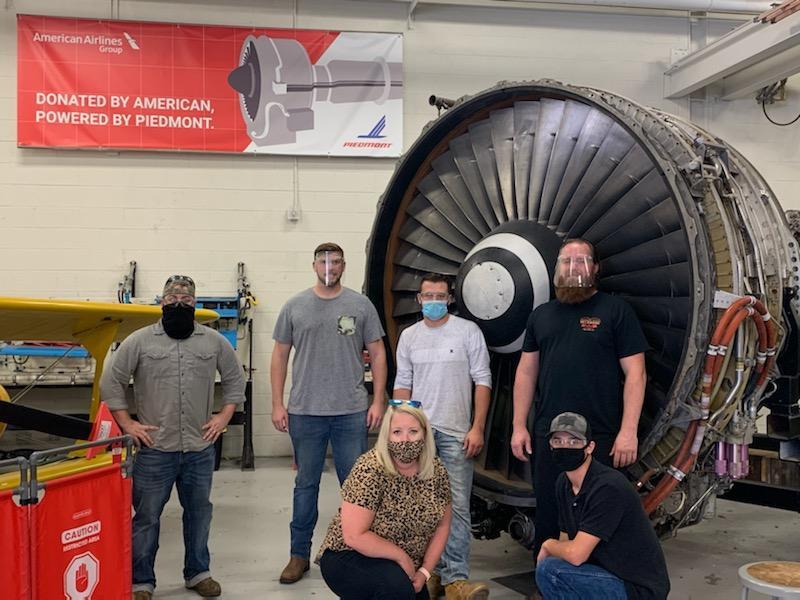
Between the rushed transition to online learning in March and watching potential job prospects evaporate as airlines and MROs furloughed or laid off employees, 2020 has been a rocky year for aviation maintenance students. However, the Pittsburgh Institute of Aeronautics (PIA) is finding new ways to connect students with the industry—and finding high demand for new hires in some unexpected places.
Fortunately for PIA, it had invested in its first virtual platform for online learning last year in anticipation of implementing it in 2020. “COVID caused that to happen very quickly,” says Mindy Pavilonis, associate director of career services at PIA. “Our instructors had to learn very quickly overnight how to do online virtual classrooms, so that actually was something that was a positive for us—that we had that in place but had not delved into it just yet.”
Between March when in-person classes were shut down and early May when its four campuses opened back up with COVID-19 safety precautions in place, PIA delivered virtual theory courses to students. Its May graduation was pushed back to the first week in June.
“For our students, obviously we’re a hands-on school, so our culture and the traits and personalities of our students are very hands-on. They were extremely happy to get back into the classroom in person,” notes Pavilonis, adding that students not only adhered extremely well to safety precautions like mask wearing and social distancing, but they returned to campus even more focused than usual without the distractions like open lunchrooms or social gatherings in the hallway.
While in-person classes were able to resume, pandemic travel restrictions have continued to be a challenge for career building activities that normally take place as students prepare to enter the aviation industry. In addition to career fairs where 20-60 employers come to visit students at its campuses, PIA typically holds in-person employer visits where students can learn about aviation companies and participate in mock or real job interviews.
In their stead, PIA has started conducting virtual employer visits to enable students to connect with prospective employers. Using video conferencing tools and a camera set up inside classrooms, companies are able to communicate with students and vice versa. Mock and regular job interviews are being conducted virtually as well, with students participating either from home or in a private office on campus.
Pavilonis says PIA has started to see a slight uptick in employers coming back on campus, such as a recent visit at its Myrtle Beach campus by a representative from Piedmont Airlines. Regional airlines like Piedmont, she notes, are actually taking advantage of the situation since the COVID-19 industry downturn has reduced some of the stiff competition from larger airlines that typically lures in new graduates due to higher pay.
According to Boeing’s latest Pilot & Technician Outlook, furloughed personnel may have luck finding employment in the previously understaffed government, business and general aviation sectors where demand for technicians remains high. Pavilonis says this is being reflected in recruitment efforts at PIA this year, with more opportunities becoming available in smaller markets such as cargo, general aviation and charter carriers.
“Prior to COVID, those industries that are now doing the brunt of the hiring are the ones that were hurting for mechanics because a lot of the students were going to the airlines by choice,” she says. “The shift definitely happened, so the majority of what I call our ‘COVID students’ from our May, June and September graduating classes have been going to various MROs, cargo and general aviation [employers]—your smaller mom and pop avionics type shops that maybe only have 5-10 employees.”
Pavilonis notes that other industries are actively trying to recruit graduates for their transferable skillsets as well—a fear that has long been held by hiring managers within MRO trying to fill their workforce pipeline. In addition to increased interest from companies within the aviation manufacturing space, she says other areas of industry such as oil and gas, steel mills and technology manufacturers have reached out to PIA looking for graduates to become service technicians.
However, Pavilonis says PIA is finally starting to see a slight uptick in the number of airlines beginning to recruit again. Larger airlines may also continue to hold a lure over smaller competitors due to their spearheading of technology adoption. New technologies for things like virtual inspections—which have skyrocketed in light of the COVID-19 pandemic—are something that was already being talked about in the classroom and Pavilonis says students are interested in emerging tech such as the use of drones for aircraft inspections.



